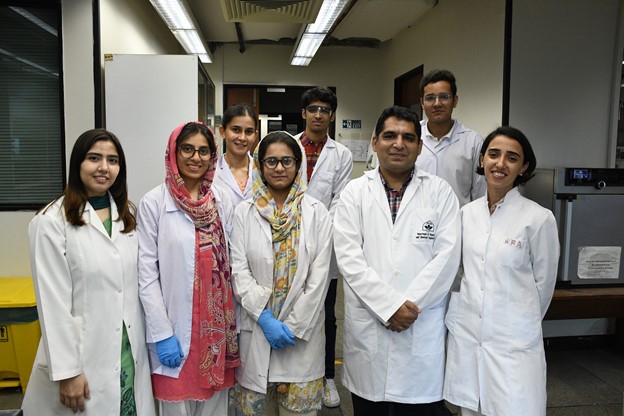
Advancing Cancer Research - Dr. Rahman Shah Zaib Saleem Receives DAAD Scholarship
Dr. Rahman Shah Zaib Saleem, associate professor in the Department of Chemistry and Chemical Engineering at SBASSE, has been awarded an internationally competitive DAAD (Deutscher Akademischer Austauschdienst) scholarship grant by the German Academic Exchange Service. This grant will provide Dr Saleem and his research team with the resources and funding necessary to study different kinds of signaling proteins and kinases. His focus during this visit will be on novel molecule called Proteolysis Targeting Chimeras (PROTACs). These molecules are new tools for the targeted protein degradation that can, in turn, potentially slow down cancer growth.
Kinase inhibitors are small molecules which inhibit the activity of cancer growth and other related diseases by disrupting the signaling pathways of the kinases. Protein kinases are enzymes that affect the biological activity of proteins and cellular signaling pathways. They are responsible for adding phosphate groups to specific amino acids. As a result, this addition of phosphates can cause the activation or deactivation of proteins, modulate their functioning and relay signals within the cell. The dysregulation of the kinase activity is often linked with diseases, including cancer, thus making kinases good drug targets.
PROTACs (Proteolysis Targeting Chimeras) are novel protein degraders discovered and currently employed in drug development for cancer. They can be designed to target the problematic proteins, including kinases, and tag them for degradation. While inhibitors block kinase activity, PROTACs eliminate the protein, which is more effective in halting cancer progression. They are also designed to be highly selective, reducing potential side effects by sparing healthy cells. The development of these compounds has a far-reaching impact on drug discovery as proteins previously described as undruggable can now be considered degradable, which, as a result, offers vast positive consequences for the treatment of various diseases.
The DAAD (Deutscher Akademischer Austauschdienst) scholarship grant has a long history of supporting cutting-edge research, allowing academics in different parts of the world to develop close ties with notable researchers in Germany. The scholarship will allow Dr. Saleem to collaborate with Dr. Stefan Knapp, and conduct research in his lab at Goethe University in Frankfurt, Germany.

“This is the beginning of a long-term collaboration”, shares Dr Saleem. He aims to identify potential new drugs, not only for for the the kinases with proven therapeutic importance, but also develop probes for the kinases that have not been targeted yet and aims to unearth their therapeutic potential.

